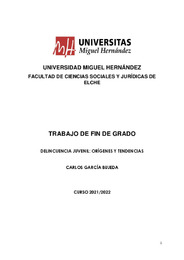Please use this identifier to cite or link to this item:
https://hdl.handle.net/11000/28259Full metadata record
| DC Field | Value | Language |
|---|---|---|
| dc.contributor.advisor | García Guilabert, Natalia | - |
| dc.contributor.author | García Bujeda, Carlos | - |
| dc.contributor.other | Departamentos de la UMH::Ciencia Jurídica | es_ES |
| dc.date.accessioned | 2022-11-07T08:31:39Z | - |
| dc.date.available | 2022-11-07T08:31:39Z | - |
| dc.date.created | 2022-06-11 | - |
| dc.identifier.uri | https://hdl.handle.net/11000/28259 | - |
| dc.description.abstract | En los últimos años se ha producido un incremento de la presión mediática en relación con el fenómeno de la “delincuencia juvenil”, lo que ha derivado en un especial interés por el análisis de los conceptos de delincuencia juvenil, su evolución y las principales tendencias que se han producido en España, estudiando sus factores de riesgo, factores de protección y posible soluciones y respuestas que pueden proporcionarse por parte del ordenamiento jurídico. El objetivo principal del presente trabajo es analizar el concepto de delincuencia juvenil y su evolución en España en los últimos años desde un doble punto de vista cualitativo y cuantitativo. Los resultados del trabajo apuntan a un ligero decrecimiento a partir del año 2020 de los delitos patrimoniales protagonizados por el género masculino y el incremento de la violencia de naturaleza filio parental, sin una diferencia significativa entre géneros, redirigiendo la tendencia ascendente que seguían los datos hasta el año 2019, así como a una evolución hacia el cumplimiento de las teorías de oportunidad, que tiene expresión clara en la pandemia del COVID-19 y el incremento de hechos delictivos dentro del domicilio, ocasionados por la situación de confinamiento. | es_ES |
| dc.description.abstract | In recent years, there has been an increase in media pressure in relation to the phenomenon of "juvenile delinquency", which has led to a special interest in the analysis of the concepts of juvenile delinquency, its evolution and the main trends that have occurred in Spain, in relation to their risk factors, protection factors and possible solutions and responses that can be provided by the legal system. The main objective of this paper is to analyse the concept of juvenile delinquency and its evolution in Spain in recent years from a both qualitative and quantitative point of view. The results point to a slight decrease from the year 2020 of property crimes carried out by the male gender and the increase in violence of a child-parent nature, without a significant difference between genders, redirecting the upward trend that the data followed until in 2019, as well as an evolution towards compliance with opportunity theories, which has a clear expression in the COVID-19 pandemic and the increase in criminal acts within the home, caused by the confinement situation. | es_ES |
| dc.format | application/pdf | es_ES |
| dc.format.extent | 44 | es_ES |
| dc.language.iso | spa | es_ES |
| dc.publisher | Universidad Miguel Hernández de Elche | es_ES |
| dc.rights | info:eu-repo/semantics/openAccess | es_ES |
| dc.rights | Attribution-NonCommercial-NoDerivatives 4.0 Internacional | * |
| dc.rights.uri | http://creativecommons.org/licenses/by-nc-nd/4.0/ | * |
| dc.subject | delincuencia juvenil | es_ES |
| dc.subject | factores de riesgo | es_ES |
| dc.subject | factores de protección | es_ES |
| dc.subject | evolución | es_ES |
| dc.subject | tendencias | es_ES |
| dc.subject.other | CDU::3 - Ciencias sociales::34 - Derecho::343 - Derecho penal. Delitos | es_ES |
| dc.title | Delincuencia juvenil: Orígenes y tendencias | es_ES |
| dc.type | info:eu-repo/semantics/bachelorThesis | es_ES |

View/Open:
TFG carlos García Bujeda.pdf
533,6 kB
Adobe PDF
Share:
.png)
